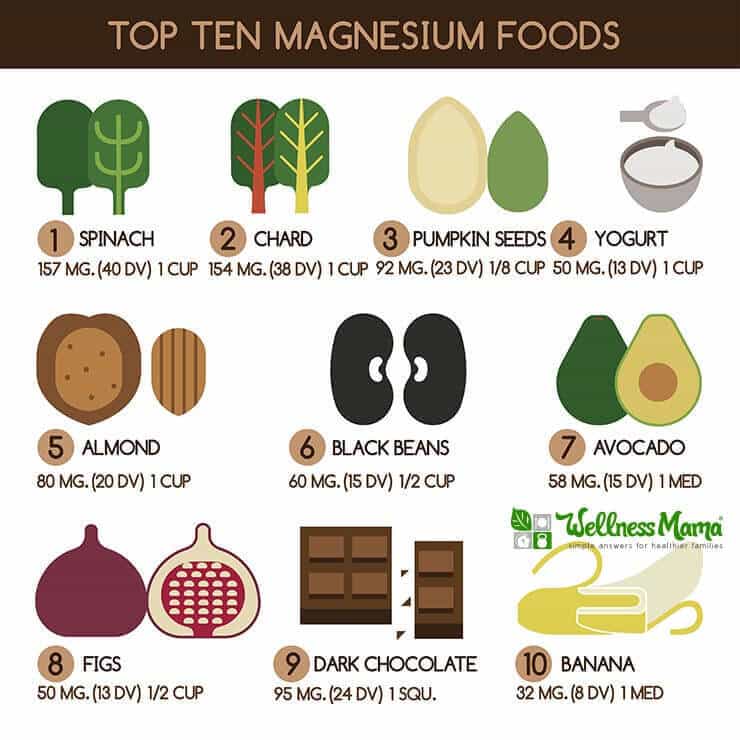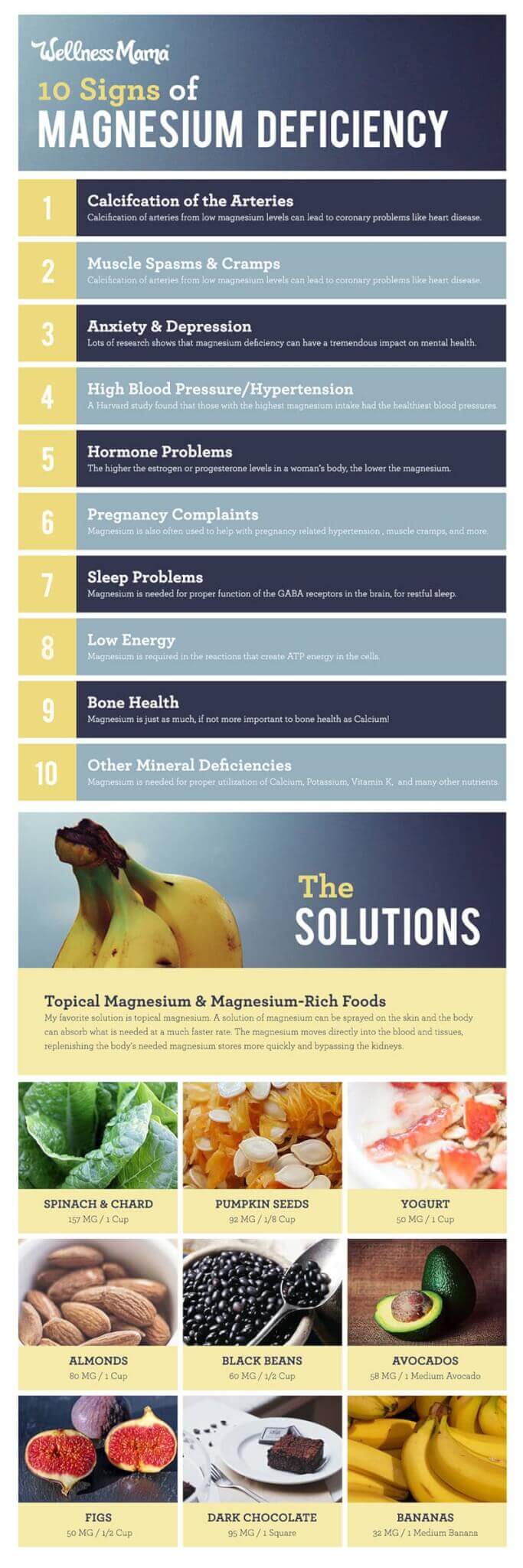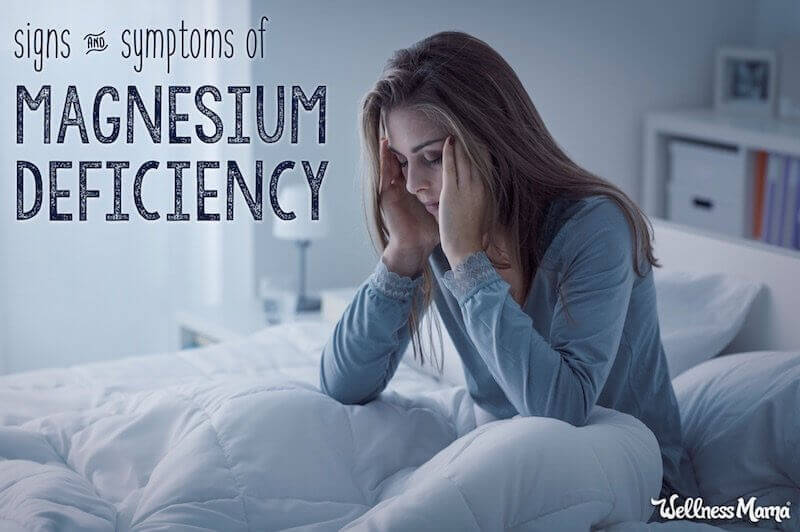Magnesium deficiency is a widespread problem and some estimates suggest that over 90% of us are deficient. I’ve been writing about magnesium for years, but am even more concerned about this problem lately.
Why Is Magnesium Such a Big Deal?
Magnesium is responsible for over 300 biochemical reactions in the body and impacts blood pressure, metabolism, immune function, and many other aspects of health.
Some experts claim that magnesium deficiency is the single largest health problem in our world today.
Why Is Magnesium Deficiency So Widespread?
There are many reasons that deficiency is so widespread in modern times (even though it wasn’t in the past).
Depleted soil conditions mean that plants (and meat from animals that feed on these plants) are lower in magnesium. Use of chemicals like fluoride and chlorine in the water supply make magnesium less available in water since these chemicals can bind to magnesium.
Common substances that many of us consume daily, like caffeine and sugar, also deplete the body’s magnesium levels…
In other words, the lucky (but small) percentage of the population that lives near the ocean (a good source of magnesium) and eats foods grown in magnesium-rich soil, drinks magnesium-rich water, and doesn’t suffer from stress or consume sugar or caffeine might be ok… but the rest of us might need some additional magnesium.
You Might Be Magnesium Deficient If…
Risk factors for low magnesium vary, but here are some clues that you might need more magnesium:
- You’re a sugar addict. (Quick, read this!…)
- You take calcium supplements.
- You drink soda and other sugary drinks.
- You suspect or have been diagnosed with celiac disease or other digestive disorders like Crohn’s disease.
- You consume a lot of processed foods and conventional dairy.
- You have a water softener or city water.
- You have Type 2 diabetes.
- You avoid green vegetables, leafy greens, and other magnesium-containing foods.
- You are an older adult, and/or take certain prescription medications.
- You eat food grown in depleted soils. (Uh, pretty much everyone!)
If you fall in any of these categories, read on!
Calcium = Fuel on the Fire
From my research, I’m convinced that excess calcium is a large part of this magnesium deficiency epidemic and that it contributes to so many health issues.
Here’s why…
While we don’t get enough magnesium, many of us get too much calcium. Calcium is added to many processed foods, dairy or dairy alternatives, and even orange juice.
When calcium levels in the body become too high, calcification can occur. Common sense, but there’s one big reason why this happens…
- Each cell in the body has a sodium/potassium pump that regulates the balance of minerals inside and outside the cells.
- Magnesium deficiency keeps this pump from working correctly. With too much calcium, the ratios are skewed, and the pump allows too much calcium into the cells. When there is too little magnesium, even more calcium is allowed into the cells.
Many nutrients come into play in the calcification equation, like vitamins K and D, but the biggest factor for over-calcification is lack of magnesium.
Magnesium Deficiency Symptoms
Due to the importance of the proper calcium/magnesium ratio in the body and the function of the sodium/potassium pump, magnesium deficiency can lead to:
1. Calcification of the Arteries
Though this is not (hopefully) the first symptom of magnesium deficiency, it can be one of the most dangerous.
Calcification of arteries from low magnesium levels can lead to coronary problems like heart attack, heart failure, and heart disease. Magnesium’s ability to prevent over-calcification is one reason why the Framingham Health Study found that consuming enough magnesium correlated with a lower risk of coronary heart disease.
In fact, half of all heart attack patients receive injections of magnesium chloride to help stop the blood clotting and calcification.
2. Muscle Spasms and Cramps
This was my most noticeable symptoms of magnesium deficiency. Just as calcification causes stiffening of the arteries, it can cause stiffening of muscle tissue as well, leading to cramps and spasms.
I had horrible leg cramps during one of my pregnancies. Potassium didn’t help at all, but magnesium fixed the problem almost instantly (which makes sense in light of the sodium/potassium pump).
Interestingly, muscle weakness caused by low potassium levels is linked to low magnesium (as explained in this American Family Physicians report) and adequate levels of one helps the other.
3. Anxiety & Depression
There is a lot of research showing that magnesium deficiency can have a tremendous impact on mental health. Psychology Today explains one possible reason:
Magnesium hangs out in the synapse between two neurons along with calcium and glutamate. If you recall, calcium and glutamate are excitatory, and in excess, toxic (link is external). They activate the NMDA receptor. Magnesium can sit on the NMDA receptor without activating it, like a guard at the gate. Therefore, if we are deficient in magnesium, there’s no guard. Calcium and glutamate can activate the receptor like there is no tomorrow. In the long term, this damages the neurons, eventually leading to cell death. In the brain, that is not an easy situation to reverse or remedy.
For me, more magnesium means fewer “mommy is stressed” moments with my kids…
4. High Blood Pressure/Hypertension
This is perhaps one of the most well-studied areas of magnesium deficiency. A Harvard study of over 70,000 people found that those with the highest magnesium intake had the healthiest blood pressure numbers.
A follow-up meta-analysis of available studies showed a dose-dependent reduction of blood pressure with magnesium supplementation.
A University of Minnesota study showed that the risk for hypertension was 70% lower in women with adequate/high magnesium levels.
5. Hormone Problems
I personally saw the effects of low magnesium in my hormone levels. The higher the estrogen or progesterone levels in a woman’s body, the lower the magnesium (pregnancy anyone?)
This is also part of the reason why pregnant women experience more leg cramps and women notice more of these muscular type complaints and PMS in the second half of their cycles when progesterone/estrogen are tanking and magnesium is depleted.
Muscle cramps related to the menstrual cycle can also be related to magnesium levels. Dr. Carolyn Dean, author of the book The Magnesium Miracle, often recommends that women with bad PMS and cramps take magnesium early in their cycles before the symptoms begin.
6. Pregnancy Complaints
Related to the hormone problems above, magnesium levels can drastically affect pregnancy health and mood. I noticed this I had tremendously less morning sickness during pregnancy when I supplemented with transdermal magnesium.
Magnesium is also often used to help with pregnancy-related hypertension and muscle cramps, to help ward off preterm labor and to alleviate headaches.
I personally always stuck to transdermal magnesium during pregnancy since it didn’t cause digestive disturbances, at least until I found the brand of oral supplement I now take (see below for both).
7. Sleep Problems
With all of the above symptoms of deficiency, it makes sense that magnesium would have a drastic impact on sleep, but the impact is often immediately noticeable when a person starts taking magnesium.
Dr. Mark Hyman calls it the ultimate relaxation mineral. Magnesium helps relax the body and the mind, which both contribute to restful sleep.
Additionally, magnesium is needed for proper function of the GABA receptors in the brain, and GABA is the neurotransmitter that allows the brain to transition to a restful state.
8. Low Energy
Magnesium is required in the reactions that create ATP energy in the cells.
Let’s flashback to freshman biology for a minute. ATP or adenosine triphosphate is the main source of energy in the cells and it must bind to a magnesium ion in order to be active.
In other words, without magnesium, you literally won’t have energy on a cellular level. This shows up as fatigue, low energy, lack of drive, and other problems.
9. Bone Health
Calcium is always considered the most important mineral for bone health, but it turns out that magnesium is just as important (or even more so!)
In cases of magnesium deficiency, the bones suffer in multiple ways:
- Vitamin D Absorption: Magnesium is needed for vitamin D to turn on calcium absorption. This is why it is also important to get enough magnesium when taking vitamin D (or magnesium levels can become even more depleted.)
- Proper Calcium Use: Magnesium is needed to stimulate the hormone calcitonin which draws calcium out of the muscles and soft tissues and into the bones. This helps explain why magnesium helps lower the risk of heart attack, osteoporosis, arthritis, and kidney stones.
10. Other Mineral Deficiencies
Many vitamins and minerals work synergistically and magnesium is a workhorse on this list. It is needed for proper utilization of calcium, potassium, vitamin K, vitamin D, and many other nutrients.
By using magnesium externally, or transdermally (meaning “across the skin”) the body can absorb what is needed without absorbing to much. It is similar to soaking in an Epsom salt bath or in the ocean.
Magnesium Deficiency: The Solution
Though the symptoms seem ominous, magnesium deficiency is actually a relatively simple deficiency for the body to resolve with the right form of magnesium.
Many of the magnesium supplements on the market are pills or solutions taken internally. These can be effective, but can also cause digestive disturbances or stress the kidneys.
Also, experts estimate that magnesium absorption in the digestive system ranges from 20-55%, depending on the source, meaning that half or more of the magnesium leaves the body as waste.
Current research shows that a combination of oral magnesium (if the right form) and topical magnesium is best for boosting low levels.
Oral Magnesium Supplement
This magnesium supplement is one of my favorites and as it is clinically proven to have a high rate of absorption (85%) and a slow-release delivery. It’s formulated to minimize digestive upset and also contains B vitamins.
Dietary Sources of Magnesium
Other real-food dietary sources of magnesium include:
- dark chocolate (this is one reason we women often crave it)
- nuts and seeds, especially pumpkin seeds and almonds (soak first if possible)
- avocados
- bananas (hmm, I’ll pass)
- leafy greens such as spinach and chard
- see below for more ideas!
Topical Magnesium Oil
My other secret weapon is topical magnesium. (I share what it did for me in this podcast episode.)
A solution of magnesium can be sprayed on the skin and the body can absorb what is needed at a much faster rate. The magnesium moves directly into the blood and tissues, replenishing the body’s needed magnesium stores more quickly and bypassing the kidneys.
I’ve shared my recipe for homemade magnesium oil (topical magnesium) and you can also try this Magnesium Lotion.
What I Do
I now use this transdermal magnesium each day and use it on my children. Dr. Mark Hyman of the Cleveland Clinic recommends up to 1,000 mg/day for adults and 4-500 mg/day for kids. We get this amount using the magnesium spray all over our bodies each night before bed.
In addition, I take some type of oral magnesium (Jigsaw Health is also a great option here) and try to consume magnesium-rich foods from organic sources with good soil quality.
For additional information, I shared this short podcast episode on magnesium with additional information.
Do you have any of these signs of low magnesium? Do you think these tips will help?

This article was medically reviewed by Dr. Terry Wahls, a clinical professor of medicine and clinical research and has published over 60 peer-reviewed scientific abstracts, posters, and papers. As always, this is not personal medical advice and we recommend that you talk with your doctor.
Do you ever struggle with any of these symptoms? Ever tried magnesium to help it out?



Leave a Reply